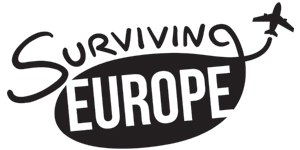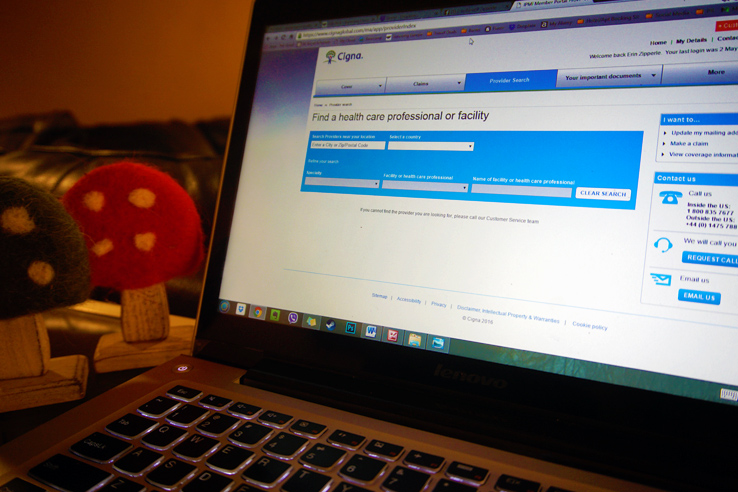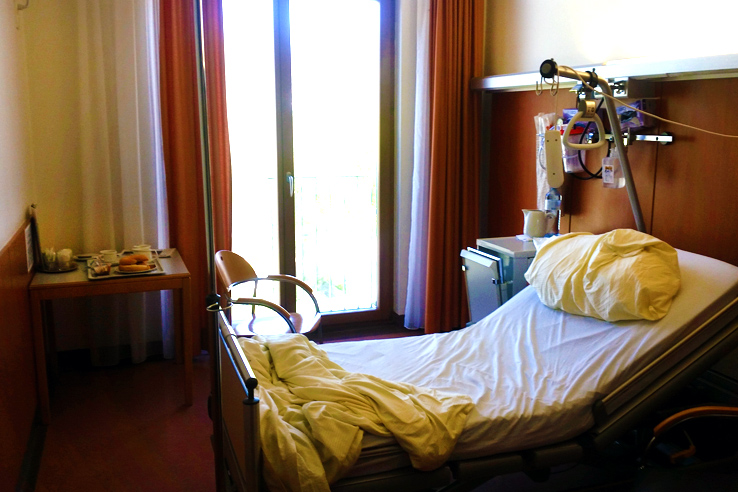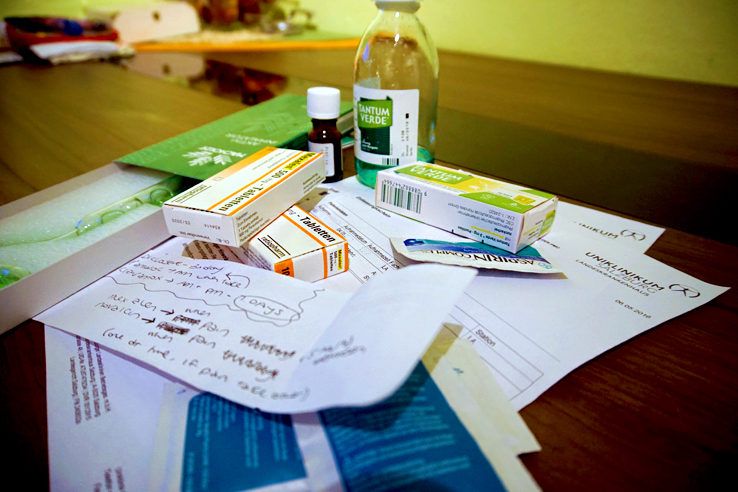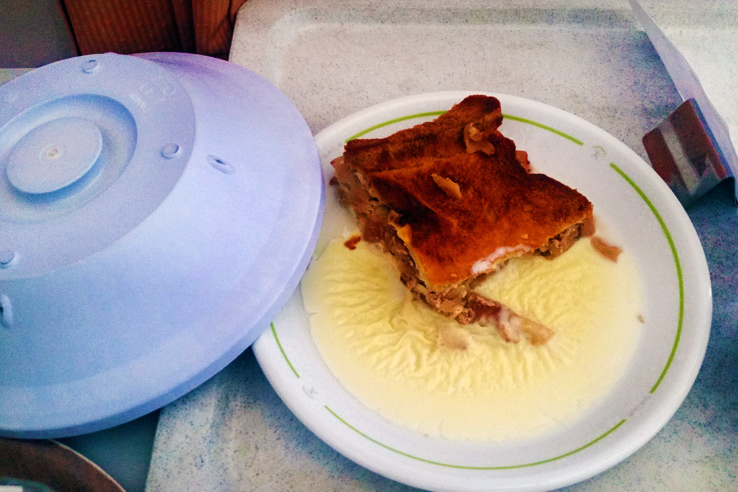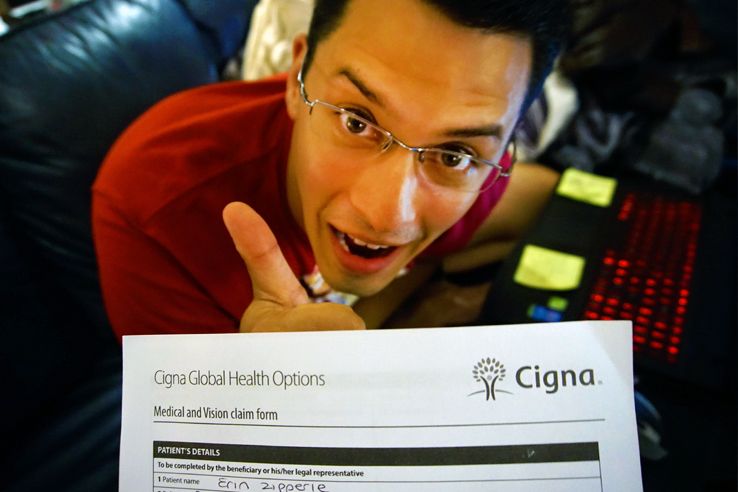When you move abroad, not every adventure will be a good one. This is certainly the case when it comes to visiting the hospital abroad for the first time.
Of course going to the hospital is never a fun experience, but combine that with the confusion of being in another country and a language that you don’t fully understand, and you’ve got a whole lotta stress and discomfort.
Before I continue, we are both totally fine and perfectly safe! Male Erin had a virus in his throat that got a little out of control. And what we thought was a simple fix, turned into a 2-week ordeal…
Our First Visit to the Hospital Abroad in Austria
It began with a sore throat.

We visited the local doctor in our village, and were in and out in minutes. She checked his throat quickly, said it was a bacterial infection and prescribed us medicine to kill the bacteria. Within 30 minutes, we were on our way. Now we were hoping that would be the end of this story, but it was only just the beginning.
…A sore throat that never ended!
Two days later, his pain was a MILLION times worse, so we decided to take matters into our own hands.
Before we moved, we’d set up health insurance with Cigna Global, since they have great expat insurance. (This turned out to be a good decision for SO many reasons, which I’ll get into later.)
We searched on their site for providers in Austria and came across the hospital in Salzburg. After a few calls and minor struggles to find fluent English speakers, we were given the information for the Landenkrankenhaus – the non-emergency hospital in Salzburg.
Luckily, they had late hours, so we hopped in the car at 8pm and drove to the hospital.
We brought everything:
- Our passport
- Residence permit card
- Health insurance
- Credit cards
- Cash (because many places do not take credit cards here in Salzburg)
If we’ve learned anything from moving abroad, it’s to be as prepared as possible at all times.
To the hospital we go.
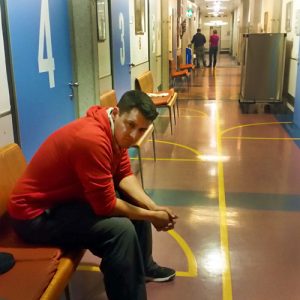
All we knew is that we had to get to the hospital and find the ENO department (ear, nose, throat department). And after a good 10 minutes of wondering the hospital grounds, we found the building we needed.
It was after-hours, so the entire place seemed completely abandoned. It felt weird and very different than what we’re used to back home. We rang the bell at the entrance, waited for about 15 minutes and were finally let in by one of the residents on duty.
They asked for our insurance and what was wrong, then added us to the list of patients for the night. Initially, we had to pay 200 euros up front to see the doctor. But we were told that we could submit the claim to our insurance at a later date and get reimbursed for all or most of it.
Okay, fine. Just get us to the doctor so Erin can get help!
After we paid, we were told to wait an hour and a half for the doctor. So we found somewhere for Erin to lay down and waited it out. I felt so terrible to see how much pain he was in. But all I could do was comfort him and wait patiently…
…And we have a doctor!
After what seemed like forever, we were called in to see the doctor. Immediately they stuck a camera through Erin’s nose to look at his throat. While this was definitely the right thing to do, he’d never had anything like that done before. We were both COMPLETELY caught off guard, but we went with it anyways.
When his throat showed up on the monitor, I knew this was going to be a bigger problem that what we’d anticipated. Even just looking at it was painful. They took a picture and talked among themselves before explaining the situation to us.
They wanted to keep him there for a few days…
Wait, WHAT?!
Not leaving the hospital?
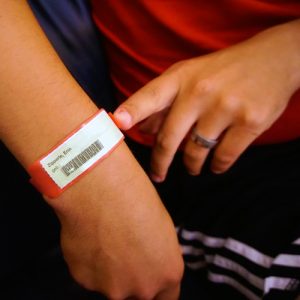
Since he couldn’t swallow food, they were nervous that his throat would continue to swell, to the point that it would affect his breathing.
That was definitely a panic moment for us.
But he would be in the right hands and this was the best place for him to be. We tried to stay calm and followed them upstairs to his room. We had nothing with us, since we NEVER expected to be staying there at all. I felt terrible. No clothes, no comforts of home – just a bed in a white hospital room.
They led us into a room for 4 people, which is something we were not used to where we are from in the USA. I didn’t want to leave him there with 3 sick strangers in a room with no curtains and constant distractions.
So I pulled the Nurse aside and explained that our insurance should cover a room with more privacy. Since it was late at night, he let Erin have a semi private room until we figured our insurance situation out in the morning. At this moment in time, I was SO happy that I spoke up and said something, which can be hard when you’re in an unfamiliar place.
Total privacy!
Luckily when I talked to Cigna the next morning, I found out that we were in fact fully insured for a semi private room. AKA we didn’t have to relocate. Major (and much needed) WIN moment!
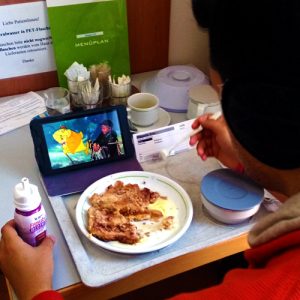
I also wasn’t allowed to sleep at the hospital with him (a rule in Austria that we NEVER anticipated), which was really tough for me. I couldn’t be there as much as I wanted to. In the USA, you can easily stay at the hospital overnight with a loved one, so this was a definite surprise and disappointment for me.
BUT despite my restrictions, I was in full nurse mode. So aside from sleeping, I was by his side literally all day. From 7am to 10pm.
In a place where nothing was familiar, I needed to be the familiar.
Our hospital days come to an end.
After 2 long days in our first (very unexpected) experience at a hospital abroad, we were told we could go HOME! Erin wasn’t feeling better at all, but we could take the antibiotics home and do the same things they were doing at the hospital.
They gave us a prescription (for 6 pills) and instructions (explained as best as they could in English) and sent us on our way.
With the medication and my top notch nursing skills, I knew he would get better. I was excited for this step, but little did I know…
The switch to home care would be the toughest part of all…
Home at last?
Now keep in mind, I had just spent the past 2 days in the hospital from 7am-10pm with Erin. I had NO time to get the apartment together and make sure everything was clean and relaxing for him. I never made it to the store for food he could actually eat or drinks that he needed to stay hydrated. So we walked into an apartment that had basically been empty for 2 days.
Erin felt absolutely awful. I was insanely overtired and overwhelmed. But I knew I had to suck it up and do everything I could to take care of him. Could I handle it?
ALL THE MEDS!?
Before we left the hospital, the Nurse tried to explain what every medication was in English to the best of her ability. She couldn’t have been nicer. BUT understandably, it’s hard for anyone to explain something in English when German is their first language. Especially when it involves complicated medical terms.
And the same is true for the opposite. I can understand some German, but definitely not German medical terms. (We’re still working on basic sentences and verbs here!)
Things can’t be fully explained and things can’t be fully understood with a language barrier.
So. All in all, I was given ALL this medication that I couldn’t read or understand (since it was all in German of course!). I didn’t feel like I had the step by step directions to take care of Erin properly. He had 6 pills total, all of which I had never seen before. So what now?
You can imagine the stress/worry/concern I felt, especially when it comes to something as serious as pain medication. I couldn’t mess up.
But before Erin could see just how stressed I was, I set him up temporarily at home, hopped in the car and headed to our local pharmacy. Maybe they could explain things to me more clearly, just maybe…
Either way, I needed a peace of mind, so I went off to search for it.
The pharmacist who saved the day.
…And then my concerns were put to rest.
I spoke with the most helpful lady at the pharmacy. Seriously, I owe her my sanity and Erin’s health. I don’t think she realized it, but she saved me from a complete mental breakdown.
She walked me through every single antibiotic and medicine that I had (in amazing English). Wrote an entire pill schedule for his day AND made sure I understood it all. She explained what every pill was and what to do if he feels a certain way.
I spent an hour with my new friend Connie and after that hour, I had never felt more relieved. She was one of the most patient and compassionate people that I’ve ever met.
A true reminder of just how many good people there are in the world.
When I walked out of the pharmacy, I was an entirely new person. I drove back smiling and ready to take care of my patient. Finally, I felt confident about what I needed to do.
Gradual hope.
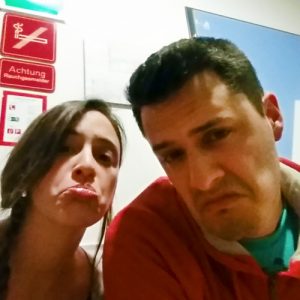
Actually, it was one of the hardest weeks we’ve had together here since our move abroad.
Erin had trouble eating, so I ran to the grocery store [what felt like] 200 times to test out different foods for him. I also revisited my friend at the pharmacy with questions. It was a busy, emotional, exhausting and of course frustrating week for all!
It honestly felt like it would never end. But gradually, Erin got a little better. We were finally on the road to recovery, and this sore throat turned minor nightmare would soon be over.
And that’s a wrap.
By two weeks, we were (more or less) back into the swing of things. Life started getting back to normal and we could finally put this whole experience behind us.
Spending time in a hospital abroad was an unexpected detour for us. But when you’re living in another country, there are times where life isn’t so glamorous. This was definitely one of those times.
But when it was over, we walked away with new knowledge and of course a new story to share…
Since we’ve already covered the story, it’s time to share the knowledge we gained from visiting a hospital abroad for the first time.
The Struggles (and Solutions!) of Visiting a Hospital Abroad
Language Barrier
The Issue: The language barrier is a give in. I’d have to say this is the hardest thing to overcome. When you’re in a hospital abroad, you’re definitely not fit to be thinking about translating words. You feel like complete crap and you’re in no mood. Or you’re a concerned family member- also not in the mood. Either way, it’s not the easiest time to use your brain so intensely.
The Solution: First of all, be as patient and understanding as possible. You’re going to expect the doctor (or someone) to speak to you in English, but it will still be hard for them. Don’t get frustrated!
Help them by trying to say simple words in the native language, and keep your emotions as calm as you can. I am sure they feel just as bad that they can’t explain things to you fully. So leave any negativity out and appreciate their help.
The Google Translate app is also INSANELY helpful. You can speak right into it and it translates what you’re saying. And writing things down is also easy effective. A lot of people can understand a language better when they read it versus trying to interpret what you’re saying.
Confusion and Frustration
The Issue: EVERYTHING is confusing and frustrating when you’re visiting the hospital abroad, especially if it’s your first time. It can be really hard to understand what’s going on sometimes. You’re not sure what’s considered normal here or what they might be doing wrong.
Confusion was a definite theme for both of us throughout this journey.
The Solution: Never stop asking questions. Ask as many questions as you want. Take pictures of every medication that you’re given – even send those pictures to a doctor you know back home so they can explain things to you. Ask ask ask.
And of course, speak up if something doesn’t seem right! You might feel annoying or obnoxious, but who cares? This is your/your loved one’s health we’re talking about. So it’s MORE than worth it.
Conditions are different than what you’re used to.
The Issue: Whether it’s better or worse, being in a hospital abroad is never going to be familiar.
You’re going to question a lot of things. You’re going to be constantly comparing what they would say or do at your home hospital versus what they are saying or doing abroad.
The Solution: Stop comparing!
Though easier said than done, you have to stop yourself from pointing out every single difference. There will be a lot of them and it’s a waste of your time and energy. No two countries do things exactly the same, so try not to be closed minded and try to trust the doctors (within reason) when you can. (But see above regarding speaking up if you see any issue!) And who knows! Maybe some things will be better.
Like this strudel they served for dessert!
Lessons learned during our first hospital abroad experience
1. We are badass (no seriously, I’m so proud of us!)
This experience was emotionally and physically draining. It tested our patience. It tested my problem-solving skills. And of course it tested Erin’s ability to stay strong and focus on his health over anything else.
We’re happy that everything turned out okay and I knew it could have been worse, but this was really hard to get through and WE DID IT! We survived our first trip to a hospital abroad and that is a major accomplishment in my book.
2. There are lots of incredible people in the world.
Seriously, the amount of people that went out of their way to make sure we were comfortable is incredible.
From the doctors at the hospital to the pharmacist with all the patience in the world. Everyone tried their very best to speak a language that isn’t their own and for that we are so appreciative. We would have never been able to maintain sanity without them.
3. It’s important to appreciate the ones you love.
Okay, I’ll get a little corny for a second. We are both so lucky to have a partner in crime that would do anything and everything for the other.
I was truly put to the test in these 2 weeks. And even when Erin was sick, he also made sure I was hanging in there – mentally and physically. A lot of teamwork was required for us to pull this one off alone in a foreign country, but we came out on top with even more love for each other.
4. The best Health Insurance is VITAL when you live overseas.
Our most important lesson of ALL! Having proper expat insurance is BEYOND important!
Be sure you go with a company that’s reputable with great customer service and of course accessible at all times too. We really lucked out when we made the decision to sign up with Cigna Global Health Insurance. We were able to call them at any point in the day, and they made sure we had all the information we needed. We felt at ease because of them.
And when you’re feeling confused and stressed at an unfamiliar hospital abroad, having your insurance be so accommodating is a huge (and much needed) relief.
Of course visiting the hospital abroad was not an experience we were looking forward to having. And it definitely was not included in the list of adventures we’d dreamed of having in Austria.
But when it comes down to it, going through such an intense few weeks and getting through it with only each other to rely on was a game changer in our lives here. Not only do we have more knowledge about Austrian pain medications than we ever thought we would, we have a newfound appreciation for each other.
Have you ever visited a hospital abroad? Tell us about your experience!
